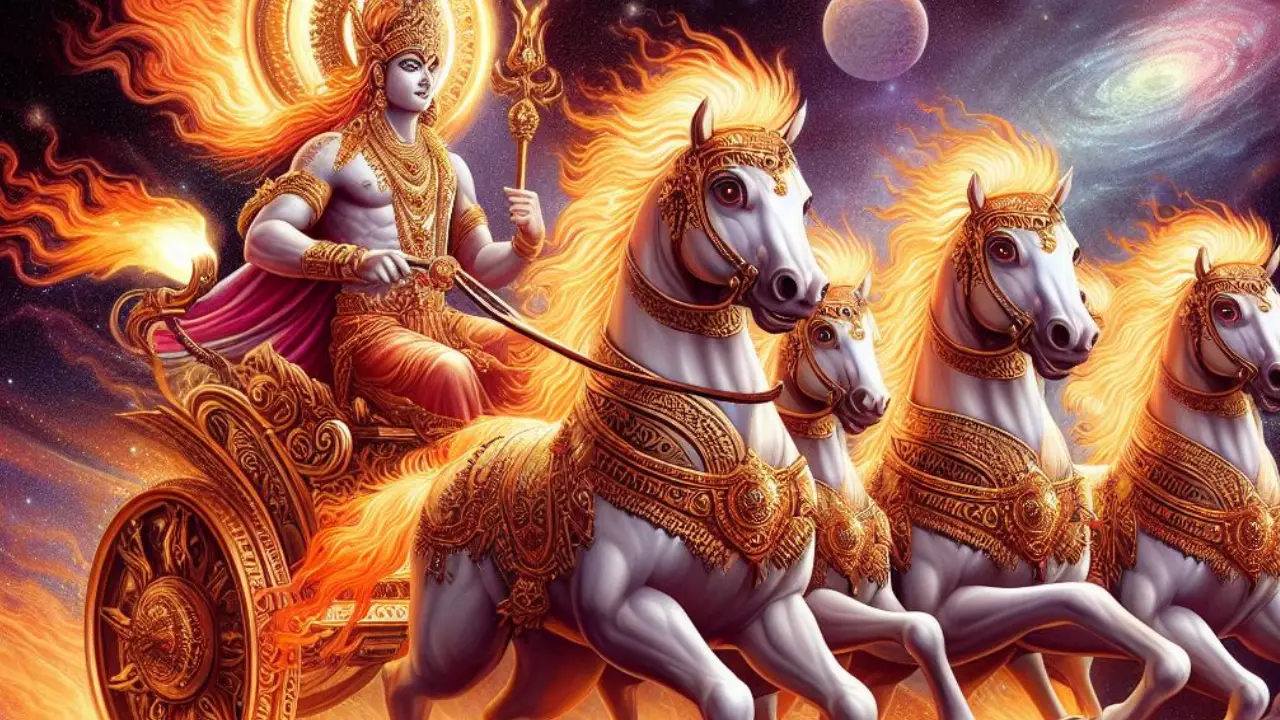In the tapestry of Hindu mythology, few deities command as much awe and reverence as Lord Agni, the God of Fire. The flames that dance before our eyes hold profound significance in ancient scriptures, symbolizing purity, transformation, and the bridge between mortals and the divine. This blog post unravels the captivating tale of Lord Agni and his prominent role in Hindu cosmology.
The Birth of Lord Agni: Celestial Origins
Agni’s divine origins trace back to the cosmic cauldron of creation. As the primordial force, he sprang from the union of Lord Brahma, the Creator, and his consort, Goddess Saraswati, representing knowledge and speech. His birth ignited the cosmos, and his radiance illuminated the heavens, earning him the title “Son of Cosmic Pair.”
Lord Agni’s Form and Attributes: The Luminous Figure
Lord Agni manifests in a resplendent form, adorned with bright red and golden hues. His piercing eyes reflect the intensity of fire, and his tongue of flames symbolizes the sacrificial fire that accepts offerings. The three-wheeled chariot he rides signifies the three phases of time – past, present, and future, which he witnesses with all-knowing eyes.
Lord Agni in Vedic Scriptures: The Divine Messenger
As the divine messenger, Agni connects mortals with the Gods. In the Rigveda, the oldest of Hindu scriptures, hymns extol his greatness and beseech his blessings. He conveys offerings to the deities, carrying prayers from Earth to Heaven. Agni’s sacred presence sanctifies rituals and ensures that they reach the celestial realms.
Lord Agni’s Consorts: Svaha and Swadha
In his matrimonial aspect, Agni has two consorts – Svaha and Swadha. Svaha personifies the mystical power of the offering, while Swadha represents the offering itself. Together, they form an inseparable bond, enriching the cosmic cycle of sacrifice and nourishment.
Lord Agni in Epics: The Immortal Witness
The great Indian epics, the Ramayana and the Mahabharata, also bear testimony to Agni’s significance. In the Ramayana, he tests Sita’s purity through the trial by fire, vindicating her chastity and righteousness. In the Mahabharata, Agni plays a vital role in Khandava Dahan, where he aids Lord Krishna and Arjuna in their quest.
Symbolism and Allegory: The Mystical Layers
Beyond the literal interpretation, Agni embodies profound symbolism. The flame signifies the illumination of knowledge that burns away ignorance, while his unquenchable appetite symbolizes the insatiable yearning for self-realization. Agni’s benign and fierce forms represent the dual nature of fire – nurturing and destructive.
Lord Agni in Daily Life: The Sacred Hearth
In every Hindu home, Agni finds a humble abode in the kitchen hearth. The sacred fire, kept alive throughout generations, symbolizes purity and divine presence. It is not merely a source of nourishment but a reminder of the divine flame within every soul.
The Five Faces of Lord Agni: Panchagni Vidya
In esoteric knowledge, Agni reveals himself in five unique forms known as Panchagni Vidya. Each aspect embodies a particular function – capturing the essence of cosmic order, karmic law, and spiritual enlightenment.
- Garhaptya Agni: The household fire, maintained by the householder, symbolizes the sacred duty of nurturing family and domestic life.
- Dakshinagni: The southern fire represents ancestral debts and rituals, acknowledging the importance of honoring departed souls.
- Ahavaniya Agni: The fire lit during Vedic rituals, receiving offerings and prayers, signifies the eternal connection between mortals and the divine.
- Sabhyata Agni: The fire that accompanies gatherings and social events symbolizes unity, harmony, and the bonds of community.
- Aruna Agni: The fire of the dawn symbolizes the dispelling of darkness, bringing hope and renewal with each rising sun.
Conclusion
The saga of Lord Agni, interwoven into the fabric of Hindu mythology, portrays a deity of multifaceted significance. As the God of Fire, Agni serves as a bridge between the earthly and the divine, a witness to sacred rituals, and a purifying force that consumes ignorance. His timeless tale continues to inspire spiritual seekers and kindle the flames of devotion in the hearts of millions.





